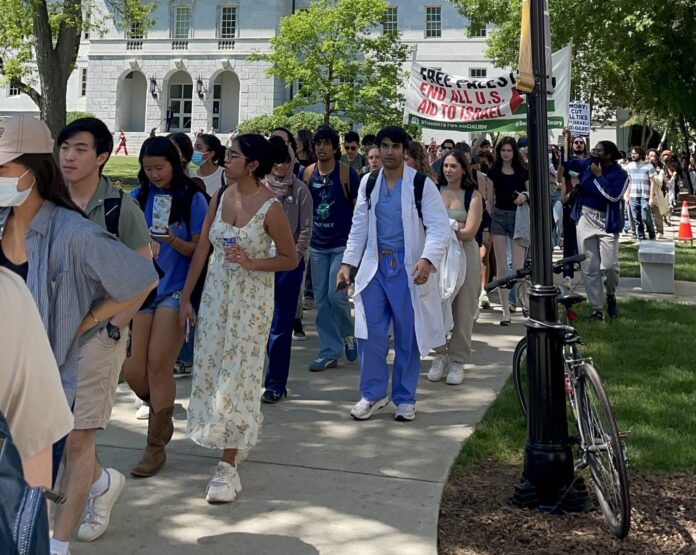
(Georgia Recorder) — The tensions on Emory University’s campus remained high Friday as protesters returned the day after an intense clash between police and demonstrators who supported Palestine and Atlanta’s Stop Cop City movement.
Emory University officials reported that 20 of the 28 people arrested Thursday had connections with the university, one of a dozen colleges across the country where demonstrations including encampments and students staging walkouts have taken place.
The recent spat of protests began last week at Columbia University where more than 100 students were suspended after erecting an encampment in solidarity with the war-ravaged Gaza, the focal point of the deadly conflict between Israel and militant group Hamas.
More than 34,000 Palestinians have been killed since hostilities increased following the Oct. 7 Hamas attacks. Those deaths include 9,500 women and 14,500 children, according to the United Nations, citing Gazan officials. The UN reports that 75% of Gazans have been made homeless, and nearly half are projected to face catastrophic levels of food insecurity.
On Friday, hundreds of demonstrators held a rally on Emory’s campus under a high police presence, and organizers promised to keep returning until the university stops aligning itself with Israeli interests and until they are able to stop the construction of an Atlanta public safety training facility.
The college campus demonstrations have sparked a contentious debate over the constitutional right to peacefully protest, and school officials claim the demonstrators disrupt the academic environment.
Emory Free Speech Forum president Matthew Eggiman said the protests were peaceful and mostly comprised of Emory students and professors. The counter protesters waved Israeli flags and played music among the crowd of pro-Palestinian protesters without being harassed, the Emory law student said.
Eggiman said the forum supports protesters’ right to peacefully express their opinions.
“I think this is very, very concerning because if there was ever a place to exercise your First Amendment right to peaceful assembly, it would be at a university,” said Eggiman, who attended the protests Thursday.
The American Civil Liberties Union of Georgia criticized the show of force by law enforcement at Thursday’s protest at Emory.
“Atlanta has historically been a place where citizens could freely exercise their rights to protest, but we have unfortunately seen a series of unconstitutional crackdowns on speech and protest across Georgia in recent years,” the ACLU said in a statement. “The ACLU of Georgia is closely watching the current protests on college campuses across the state. Colleges and universities should be places where viewpoints, expression, debate, and free speech are encouraged, not suppressed.”
Republican Gov. Brian Kemp praised law enforcement for swiftly intervening on Emory’s campus.
“Across the country, Americans have watched with horror as radicals have terrorized Jewish students and forced them to evacuate from their dormitories and classrooms,” Kemp said in a statement Thursday. “College campuses are designed to be places of learning and often civil discourse, but in Georgia, they will never be a safe haven for those who promote terrorism and extremism that threatens the safety of students.”

Emory students expressed dismay and anger Friday at the university’s handling of the demonstration that turned violent as Atlanta police and state patrol troopers dismantled the protestors’ encampment.
In a mass email sent Thursday, Emory University President Greg Fenves said the university would not tolerate vandalism and violence that runs counter to university’s values and interferes with its educational and research responsibilities.
“As Emory community members continue to express themselves and protest, we are committed to working with students and faculty, open expression observers, and the EPD to facilitate their peaceful expression,” Fenves wrote.
After an emergency faculty meeting Friday afternoon, Emory college faculty voted no confidence in Fenves. Students and faculty also marched on the quad Friday evening in protest of the arrests and in support of Palestine before moving to Cox Hall, where protesters barricaded themselves inside the building.
Sabrina Schoenborn, a senior at Emory, said the protestors were mostly Emory community members and that the university’s initial emails categorizing the protestors as outsiders were “factually incorrect.”
During Thursday morning’s protest, Schoenborn handed out books to a crowd of about 30 people, most of whom she recognized as Emory students.
“I remember hearing someone saying ‘you need to clear out’ and then immediately all of the police officers rushed. It felt like there was a police for every protester at that point,” Schoenborn said. “All that I could hear was screaming and the sound of pepper spray bullets.”
“I don’t think people expected it to be so violent so quickly against the majority Emory community population,” she added. “It’s some type of betrayal.”
Maddie Lampert, an Emory junior, said the escalation with state troopers was not an effective solution if administrators wanted to prevent protests from disrupting final exams and graduation ceremonies.
“As a Jewish student, I feel, in this moment of time, much less at risk of violence from being Jewish than just from being a student standing up for free speech,” Lampert said.
The protests have also spread to other schools in Georgia this week. Students also had a walkout at Kennesaw State University and another rally was held at Georgia Tech’s campus.
A number of Morehouse students and alumni have expressed anger in response to the school’s administration inviting President Joe Biden to speak at the historically Black college’s graduation ceremony on May 19.
Edward Ahmed Mitchell, national deputy director of the Council on American-Islamic Relations, has condemned the Morehouse administration for inviting Biden, who has demonstrated unconditional support for Israel.
On Wednesday, Biden signed a bipartisan military funding package that provides billions of dollars more in federal aid to Israel.
“As a graduate of Morehouse College and a civil rights attorney whose work has been inspired by the values of our historic institution, I am deeply disappointed to learn that President Biden plans to speak at the 2024 commencement while his administration funds the Israeli government’s genocide in Gaza,” Mitchell said.
State Rep. Ruwa Romman, a Duluth Democrat, Palestinian-American and Georgia’s first Muslim woman state legislator, said she was alarmed by the tactics used by Georgia State Patrol, including deploying tasers and gas.
“Attacking students is a red line,” she said. “At the end of the day, in a university setting, students are meant to learn. That includes learning on how to engage with issues.”
“If you go from seeing students attempting to engage on an issue in a way that they see to be an effective way to make change, and you immediately use police violence against them, we are teaching them the wrong lessons,” she added.
Gazans’ use of social media to document life amid the crisis has helped convince young people to support their cause, Romman said.
“It seems to me that this has been because of the increase of social media, because of the fact that Palestinians are now speaking in English to their audiences and trying to spread awareness, the younger generation that is more exposed to those resources of information are way more likely to kind of see the situation for what it is,” she said.
With the November election fast approaching, Biden and his surrogates are stepping up their visits to battleground Georgia, but reaction to the ongoing war could sour the spirits of the young Georgians who helped Biden win the state in 2020.
Vice President Kamala Harris is expected to come to Atlanta Monday to kick off a multi-state tour highlighting the administration’s efforts toward increasing economic opportunity for Americans ahead of Biden’s scheduled visit next month. Biden’s last visit to Georgia was briefly disrupted when a protester called him “genocide Joe.”
Transportation Secretary Pete Buttigieg was one of several high-ranking Biden administration officials to visit the 10th annual conference of the African American Mayors Association in Atlanta Friday, where he met with mayors from around the country whose cities have benefited from federal spending on transportation projects.
The Georgia Recorder asked Buttigieg whether Biden was concerned about arrests at colleges around the country.
“What I will say is the president believes in the safe expression of people’s First Amendment rights and in safety on campus for everyone,” he said, declining to comment further because he said he had not been briefed on the situation at Emory and had not discussed the issue with the White House in the past 12 hours.
Biden told reporters in Virginia Monday that he condemns “the antisemitic protests” as well as “those who don’t understand what’s going on with the Palestinians”
Romman said she is worried about Biden’s reception at Morehouse and elsewhere, including the Democratic National Convention set for August in Chicago.
“As long as the administration does not show serious policy changes, I don’t know how we’re going to see a stop to the disruptions,” she said.
“I’m worried about November, but I’m also worried for the convention,” she said. “Illinois has one of the largest concentrations of Palestinians in the country, more than Michigan, literally more than anywhere else. And so I don’t know how you can go to a state like Illinois with one of the largest Palestinian populations and expect everything to go dandy. And similarly with Georgia, the people who are incredibly motivated on this are understandably motivated because either they’ve been personally impacted or they know that someone who’s been personally impacted or they are watching our government fail to hold a client state, for lack of a better word, accountable.”
Reporter Chaya Tong contributed to this report






